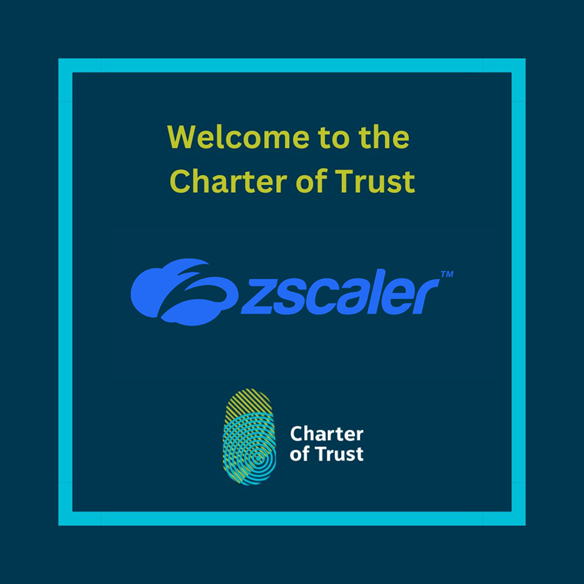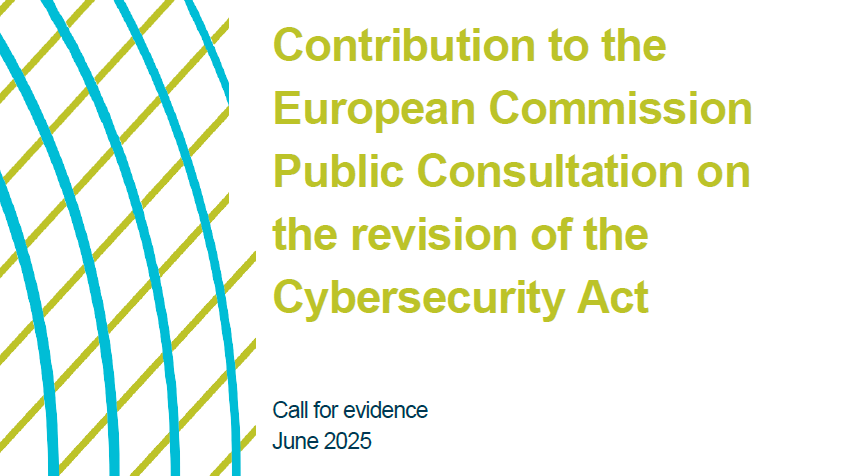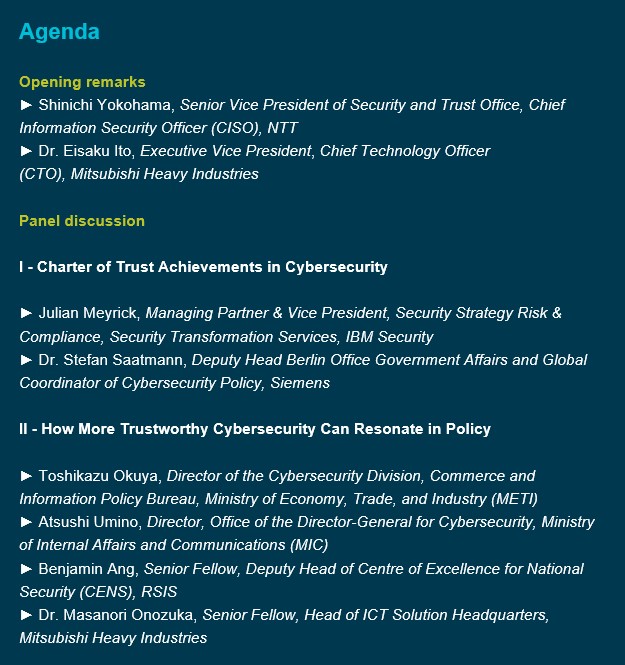On October 13th, over 200 attendees dialled in from Asia and around the Globe for the Charter of Trust Tokyo Virtual Roadshow: “How the industry is reshaping cybersecurity in our connected world”, an event hosted by Mitsubishi Heavy Industries and NTT.
Shinichi Yokohama, Chief Information Security Officer (CISO) of NTT and Dr. Eisaku Ito, Chief Technology Officer (CTO) of Mitsubishi Heavy Industries opened by highlighting the impact of the pandemic: “We have seen an increased decoupling of movement of goods, services and people paralleled by a surge in online communications, making trust-based communication matter all the more today”. Mr. Yokohama advocated for a collective emphasis on detection and response – a considerable but necessary paradigm shift given that a perfect protection is no longer possible. That is why Charter of Trust establishes Trust through people and processes.
Julian Meyrick, Vice President at IBM Security and Dr. Stefan Saatmann, Global Coordinator of Cybersecurity Policy at Siemens provided the audience with an introduction into the Charter of Trust’s vision and activities. They outlined the Charter of Trust’s 10 principles and its global collaborations with government agencies and research institutes, notably through the Associated Partners Forum.
Toshikazu Okuya, Director of the Cybersecurity Division at the Japanese Ministry of Economy, Trade, and Industry (METI) presented the advances of the Cyber-Physical Security Framework (CPSF). Atsushi Umino, Director, Office of the Director-General for Cybersecurity at the Japanese Ministry of Internal Affairs and Communications (MIC) shared Japan’s various policy initiatives on cybersecurity, from 5G to IoT, and safer teleworking measures.
Lastly, Benjamin Ang, Senior Fellow, Deputy Head of Centre of Excellence for National Security (CENS), RSIS, emphasised the importance and benefits of cross-sector information-sharing between academia, public and private sectors.
As panellists shared their insight on the state of cybersecurity regulation in Japan through the lenses of the private sector, academia and the regulators, all agreed that the fast pace of this sector requires agility from all actors.
Stay tuned for more Charter of Trust virtual events with online roadshows planned in Geneva and Madrid, as well as deep-dive webinars on the Charter of Trust Principles such as “Education,” “Security by Default,” and “Transparency and Response.”


You may also like

Charter of Trust Welcomes Zscaler
Zscaler is a leading cloud enterprise security provider helping global businesses accelerate their digital transformation by becoming more agile, efficient, resilient, and secure.
With Zscaler as a partner in the Charter of Trust, we aim to strengthen global cyber resilience through trust – by fostering actionable collaboration between industry leaders, governments, and public-private platforms. Zscaler brings robust expertise and innovation to the table, making it the ideal partner to drive this mission forward.
“Zscaler is excited to drive meaningful change alongside our new partners, laying a foundation of trust essential for successful digital transformation,” said Sam Curry, Zscaler CISO. “In today’s world, the need for reducing inherent trust and default access has never been greater. To truly stay ahead of ever-evolving threats, we must unite as a coalition of practitioners. Cyber attackers aren’t taking breaks, and with advancements like artificial intelligence, quantum cryptography, and emerging technologies on the horizon, collaboration is the key to securing the future.”
“We are proud to welcome Zscaler to the Charter of Trust. Their focus on cybersecurity innovation and commitment to openness reflect our shared ambition to create a safer, more resilient digital future. Together, we’ll strengthen trust, transparency, and security across the global digital landscape.” highlighted Dr. Summit Chada, Charter of Trust Co-Chair and COO Group Security & Business Lines CISO at Atos.
“With Zscaler as a Partner of the Charter of Trust, we believe that we can strengthen the global commitment to secure digital transformation by combining technological innovation with the Charter of Trust’s collaborative approach to cybersecurity leadership.” Ralf Schneider, Charter of Trust Co-Chair and Senior Fellow and Head of Cybersecurity and NextGenIT Think Tank at Allianz SE, welcomes Zscaler to the Charter of Trust.
We are excited to join forces and work together to advance digital trust and security across industries.

Contribution to the EU Commission Public Consultation on the revision of the Cybersecurity Act
We support Policy Option 2, which focuses on targeted regulatory measures that address key challenges without creating unnecessary complexity. In this context, we emphasize the need to enhance the role and resources of ENISA, to ensure effective implementation of both current legislation and the European Cybersecurity Certification Framework (ECCF).
Our recommendations aim to improve transparency, collaboration, and efficiency across the EU’s cybersecurity landscape. These include:
- Introducing clear timelines for the development of certification schemes.
- Enhancing stakeholder engagement throughout the process.
- Establishing more structured communication channels between ENISA, the Stakeholder Cybersecurity Certification Group (SCCG), and sectoral ISACs (Information Sharing and Analysis Centers).
We call for a stronger ECCF, one that is transparent, inclusive, and aligned with international standards to foster global interoperability and ease compliance for organizations across borders. Equally critical is the harmonization of certification practices across EU member states and the mutual recognition of certifications to minimize regulatory fragmentation.
The Charter of Trust advocates for technically robust, standards-based certification schemes, with well-defined roles and responsibilities. We also stress the need for clarity on the interplay between voluntary and mandatory certifications, particularly in relation to the upcoming Cyber Resilience Act (CRA).
To streamline compliance and reduce administrative burden, we propose a unified, risk-based incident reporting regime that consolidates requirements under regulations such as NIS2, CRA, GDPR, and DORA. This would not only simplify reporting for organizations but also enhance the EU’s overall cyber resilience. In addition, we recommend incorporating liability protections and grace periods for incident disclosure.
Finally, we urge the Commission to strengthen supply chain security by adopting a risk-based classification approach and establishing baseline cybersecurity requirements for ICT suppliers.
The Charter of Trust remains fully committed to supporting the European Commission in shaping a secure, resilient, and trusted digital future for Europe. We look forward to continued collaboration in building a cybersecurity framework that meets the needs of all stakeholders, today and in the years to come.





